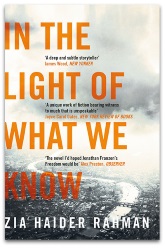In the Light of What We Know
Zia Haider Rahman

Paperback: 512 pages
|
For a big book just shy of 500 pages, Zia Haider Rahman’s debut novel In the Light of What We Know can be effortlessly boiled down into a simple, bare-bones summary. One morning in 2008 an unkempt South Asian man with little in the way of baggage turns up on the doorstep of a wealthy investment banker’s London townhouse. The banker, born to privileged Pakistani parents, is nameless; the visitor is Zafar, a Bangladeshi raised in Britain and a long-lost college friend who has finally reappeared after years of absence. The two men talk and walk, pooling memories, filling in the blanks. A journey unfolds with incident-rich pit-stops in Kabul, New York, Oxford, Princeton, Islamabad and Dubai. Along the way are discourses and meditations on topics as diverse as love, war, literature, religion, music, class, empire, finance and mathematics. It is a motley mix in a vast, sprawling, continent-hopping narrative; a novel so capacious it should sag, so ambitious in scope it should falter. But Rahman snares us from the start and pulls us on until his bitter end. The banker announces early on that the book we are reading is based on recordings of his conversations with Zafar, together with the material culled from Zafar’s extensive notebooks. Although he intercuts this with snippets from his own life – his road to success culminating in a present troubled by job insecurity and a marriage on the skids – Rahman’s novel is essentially Zafar’s story. It is quite a tale. We are led through Zafar’s formative years, from the happiest time of his life in rural Bangladesh to a period of uncertainty and detachment as a shy mathematics genius at Oxford. In New York he establishes a reputation as “a bright though erratic financial wizard” on Wall Street, while in post-9/11 Pakistan and Afghanistan he shines as an “adviser” – or is he a spy? – among Brits who are proficient players of “the game of Empire and Ego”. Zafar drifts, perpetually unmoored, and is stabilised only by great love, Emily, who resurfaces at surprise junctures in his narrative. In contrast to his well-connected banker-friend who hobnobs with Hamid Karzai and city-slicking movers and shakers, Zafar remains gauche, reserved, absorbed in mathematical worlds. He may dominate the book but Rahman ensures he stays lightly sketched, which in turn renders him decidedly shifty. The reader, like the banker, must piece together Zafar’s past and sift certain rumours. When we learn “he had killed a man” and when Zafar is told he is “an Oxford man”, we recall the same mystique that shrouds Jay Gatsby. Indeed, Rahman’s novel resembles Fitzgerald’s and also Brideshead Revisited insofar as it is, at heart, about one man being captivated enough by another as to want to tell his story. Rahman takes a considerable risk here – a lengthy novel about a Fascinating Friend can be as deadening as a prolonged account of an Interesting Dream – but fortunately his characters, their exploits and their colourful and intelligent debates are thoroughly compelling. Not that the book is impervious to criticism. In the Light of What We Know is, quite simply, too eager to display its knowledge. All too often Rahman’s characters digress to quote famous writers and flaunt facts. “There’s a funny little story about Charles II…” begins one offshoot; or “Do you know what an axolotl is?”; or “What do you know about the Ponte Vecchio?” At best, explanations give rise to elaborate metaphors. At worst, they transform a careful calibrated character into a walking thesaurus. Some pages are thick with footnotes, and chapters only get under way after two or three chunky epigraphs that are prone to clogging the whole page. At times, it isn’t an editor’s red pen that is required but a scythe. But if In the Light of What We Know suffers from being too know-all, it constantly redeems itself by being knowing. Rahman’s subtle, ironic touches invite us to see more than his characters do or help obscure key truths so as to wrong-foot us later. Alongside these deft flourishes are numerous passages of bravura prose – particularly in the climactic scenes where we find ourselves “circling towards violence” and privy to shock confessions. “Epic” is now a word too freely bandied around to describe big, multifaceted novels. And yet that’s what Rahman’s hulking debut is: epic in scale and reach, and pulsing with life. Whittled down, however, it concerns one flawed man and his unique and mesmerising journey. Ultimately it falls marginally short of being the masterpiece it should be but it is full of supremely good intentions. Malcolm Forbes, The National, 16 April 2014 First chapter excerpts, In the Light of What We Know _ GRANTA Reviews |
